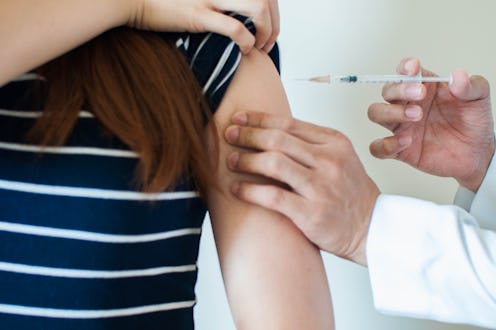Health
Why You Feel Tired After Getting A Flu Shot
Your sleepiness won't last long.

Flu season is nothing to mess around with. In a typical year, the Centers for Disease Control and Prevention (CDC) estimates that there are anywhere from 9 million to 41 million cases of flu-related illnesses. While many can recover from influenza at home, between 140,000 to 710,000 people are hospitalized and 12,000 to 52,000 people die from the flu each year in the United States. If you’re thinking about getting a flu shot, you’re in good company. An influenza vaccine can make you less likely to get sick, make your illness milder if you do get sick, and prevent others around you who aren't able to get the flu shot from getting ill, thanks to herd immunity. But there are certain side effects of getting a flu shot: Many people complain of feeling tired after getting a flu shot, but doctors say that isn't a cause for worry (or a reason not to get vaccinated).
Why Does The Flu Shot Make You Tired?
Dr. Gustavo Ferrer-Gonzalez, M.D., the founder of the Cleveland Clinic Florida Cough Center, tells Bustle that the tiredness some people feel is a result of “the body’s defenses (immune system) responding to the dead virus present in the vaccine." He further explains, “The symptoms are the result of the antibodies produced by our body in order to build up an immune response. In essence, a foreign substance (dead virus) entering our body that our defenses recognize and respond with fatigue, tiredness, low-grade fever, and lousiness.”
The fatigue won't last too long though, says Dr. Sanjeev Jain, M.D., board-certified allergist and immunologist and founder of Columbia Allergy. The sleepy sensation usually resolves itself in 24-48 hours, Jain tells Bustle.
What Other Side Effects Can The Flu Shot Cause?
"Soreness, redness, and swelling where the shot is given, fever, muscle aches, and headache can happen after receiving the influenza vaccine," Jain says.
Side effects aren't necessarily a bad sign. Jain tells Bustle that symptoms arise because your body is letting the flu shot do its thing. "When you get a vaccine, your immune system gets activated in order to build a protective response against the viral protein," he says. "As a result of this, there is a transient release of inflammatory mediators in your body that causes these symptoms." In other words, you might get a little sore and swollen.
"Usually, the post-vaccination symptoms are relatively mild," Jain says. "You can take acetaminophen (AKA Tylenol) to help relieve these symptoms if they are bothersome."
Why Side Effects Shouldn't Stop You From Getting A Flu Shot
"The benefits of getting a flu vaccine significantly outweigh the temporary adverse effects associated with it," Jain says. The flu vaccine prevents millions of illnesses and flu-related doctor visits each year, the CDC says. That can translate into a 60% decrease in flu-related trips to the doctor or ER. The CDC estimates that one in five people get the flu each year, so the odds that you or someone you’re close with will get the flu are pretty high. The risk of a flu shot causing serious harm or death is "extremely small,” the CDC says, while the actual flu can make you or those around you dangerously sick, or potentially lead to death. Even when someone is inclined to "ride it out" if they get sick rather than get vaccinated, Jain points out that getting the flu shot can help protect those around you, especially those who might not be able to get it themselves.
There are some ways to combat that tired feeling, according to Ferrer-Gonzalez. First, he recommends that you take it easy after getting the vaccine. “This is the time to rest. Don’t push through. You need time to restore your energy.” He also suggests drinking plenty of fluids. Rest and hydration should kick your side effects to the curb in no time, and the flu shot will protect you and those around you all season long.
Experts:
Dr. Gustavo Ferrer-Gonzalez, M.D., founder of the Cleveland Clinic Florida Cough Center
Dr. Sanjeev Jain, M.D., board-certified allergist and immunologist and founder of Columbia Allergy
This article was originally published on